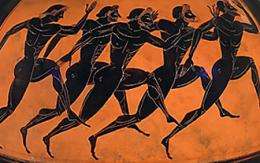Ancient Olympians glorified gods and community

As the 2012 Summer Olympic Games open in London on Friday (July 27) with an internationally televised glitzy ceremony, including a parade of more than 10,000 athletes from around the world who will compete in 32 sports, you might wonder what the ancient Olympics were like.
Margaret E. Butler, assistant professor of classical studies at Tulane, says the XXX Olympiad Games bear only partial resemblance to the ancient games in Greece, which had nine main events.
Always held in the summer, the ancient games began with religious offerings to the gods. Athletes from Hellenic city-states could participate, but groups that the Greeks considered “barbarians” were barred from competing. At one Olympic festival, Spartans were banned for political reasons.
When the games first were organized in the 8th century B.C., Greeks celebrated the aesthetic of “kalos-kagathos” — the good and beautiful man with a sound mind and sound body, says Butler, who teaches the course Temples and Festivals in Ancient Greece. As elites, athletes were afforded superior nutrition and leisure time to train.
“A gentleman in ancient Greece had to recite Homer as well as perfect his physique,” Butler says.
In a time long before drug testing, athletes vowed in front of the temple of Zeus never to cheat. Through their excellence in sports, the athletes honored the gods, and in turn, some Greeks believed that the gods would reward a winning athlete’s entire community.
Instead of today’s gold, silver and bronze medals and lucrative advertising deals, ancient Olympians received laurel- or olive-leaf wreaths, and some were fed at public expense for the rest of their lives.
“Winning wasn’t just about you, the athlete,” Butler says. “It also had to be about his community.”
One thing remains the same — the host city then, as now, would profit from the pilgrims who came to the Olympic games.
Provided by Tulane University

















